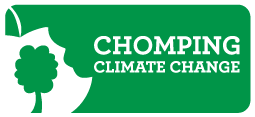Honoring the memory of Robert Goodland, co-founder of Chomping Climate Change
 Robert Goodland trekked in the Himalayas every year, and on his way home last week to Washington, D.C. his health took a turn for the worse, so he never made it home.
Robert Goodland trekked in the Himalayas every year, and on his way home last week to Washington, D.C. his health took a turn for the worse, so he never made it home.
Robert co-founded the “Chomping Climate Change” website, years after he grew up with a special interest in nature. Robert earned a bachelor’s degree in biology in 1960 from McGill University in Canada. For his master’s degree, he researched tropical ecology in a remote part of Guyana with no roads or electricity. Then the Canadian Government awarded him a scholarship for PhD research on ecosystems in Brazil.
Robert became a professor in 1974 at the University of Brasilia, where he established a program to teach tropical ecology and environmental assessment. Then he moved to the Instituto Nacional de Pesquiasas da Amazonia in Manaus, where he designed Brazil’s first graduate course in applied tropical ecology. That led Robert to co-author the book Amazon Jungle: Green Hell to Red Desert. It attracted much favorable review, and became viewed as a seminal work in the birth of the international environmental movement.
From 1975 through 1978, Robert served as an environmental consultant for World Bank projects. He was also recruited to help establish the Cary Center for Ecosystem Studies to complement the New York Botanical Gardens and the Cary Arboretum in Millbrook, New York.
In 1978, Robert became the first full-time ecologist at the World Bank in Washington, D.C. He was initially assigned to the task of screening every single proposed World Bank project, and selecting for scrutiny those with the largest potential impacts. Robert made recommendations, but they lacked policies to back them up, and project designers resisted implementing his recommendations. To remedy this, Robert took a lead role in drafting environmental and social policies for the World Bank.
To foster implementation of the new World Bank environmental and social policies, Robert worked to develop numerous conferences, training programs, and guidance materials. The policies and guidance materials pioneered by Robert essentially served as environmental and social roadmaps for many countries that lacked regulatory frameworks to provide such roadmaps.
Many aid agencies and banks became interested in adapting the World Bank’s environmental and social policies for their own purposes. Robert pressed them to coordinate among themselves in ways that continue to this day. As a capstone to Robert’s work on the principles of environmental and social assessment, he served a term as President of the International Association of Impact Assessment.
As Lead Environmental Advisor for the World Bank Group, Robert bolstered his policy work with sectoral work. This included stopping the World Bank Group from financing projects involving tobacco and asbestos. It also included avoiding the worst types of agricultural and forestry projects, such as those featuring land colonization, transmigration, and logging and ranching in tropical forests.
Robert worked to hold project proponents accountable to people adversely impacted by development projects. He also worked for many years on trying to get the International Monetary Fund to do something about the adverse social impacts of their operations, which tend to have much broader reach than do most projects financed by the World Bank.
After Robert’s official retirement from the World Bank in 2001, he was recruited to play a key role in the independent Extractive Industries Review at the World Bank Group. The review concluded with recommendations for various ways to replace fossil fuels with renewable energy. He also served as a senior fellow at the World Resources Institute, where he co-authored a report on human rights. Elsewhere he worked pro bono on numerous environmental and social assessments.
The Library of Congress lists more than 40 of Robert’s writings. He was the first winner of the World Conservation Union’s Harold Jefferson Coolidge medal for lifetime achievement in the conservation of nature. Robert pressed to work on the most difficult of environmental and social issues of his time. He was particularly happy to have been known as the World Bank’s “conscience,” in which role he befriended many environmental leaders around the world. Robert loved climbing mountains and taking care of the grounds outside his home (both literally and figuratively).
To his last days, Robert continued to build on his work with Jeff Anhang on a 2009 article entitled “Livestock and Climate Change,” which assessed how replacing some livestock products — and reforesting land thereby freed from livestock and feed production — could be the only pragmatic way to stop climate change before it might be too late. This work became widely cited, including by Bill Gates and by Paul McCartney’s Meat Free Monday campaign. Robert was invited by the UN Food and Agriculture Organization to speak about this work in Rome and in Berlin, and by the Chinese Academy of Social Sciences to deliver a keynote speech in Beijing. To develop further awareness, Robert worked to launch a website called “Chomping Climate Change.” Worldwide interest in this work seems likely to grow well into the future.


